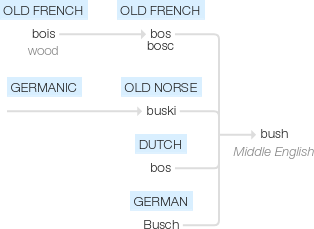Bush
Middle English: from Old French bos, bosc, variants of bois ‘wood’, reinforced by Old Norse buski, of Germanic origin and related to Dutch bos and German Busch . The sense ‘uncultivated country’ is probably directly from Dutch bos .
wiktionary
From Middle English bush, from Old English busċ, *bysċ(“copse, grove, scrub”, in placenames), from Proto-West Germanic *busk, from Proto-Germanic *buskaz(“bush, thicket”), probably from Proto-Indo-European *bʰuH-(“to grow”).
Cognate with West Frisian bosk(“forest”), Dutch bos(“forest”), German Busch(“bush”), Danish and Norwegian busk(“bush, shrub”), Swedish buske(“bush, shrub”), Persian بیشه (biše, “woods”). Latin and Romance forms (Latin boscus, Occitan bòsc, French bois and buisson, Italian bosco and boscaglia, Spanish bosque, Portuguese bosque) derive from the Germanic. The sense 'pubic hair' was first attested in 1745.
From the sign of a bush usually employed to indicate such places.
From older Dutch bosch (modern bos(“wood, forest”)), first appearing in the Dutch colonies to designate an uncleared district of a colony, and thence adopted in British colonies as bush. Could alternatively be interpreted as a semantic loan, as bush (etymology 1) is cognate to the aforementioned archaic Dutch bosch.
Back-formation from bush league.
From Middle Dutch busse(“box; wheel bushing”), from Proto-West Germanic *buhsā. More at box.
etymonline
bush (n.)
"many-stemmed woody plant," from Old English bysc (found in place names), from West Germanic *busk "bush, thicket" (source also of Old Saxon and Old High German busc, Dutch bosch, bos, German Busch). Influenced by or combined with Old French (busche "firewood") and Medieval Latin busca (source also of Italian bosco, Spanish bosque, French bois), both of which probably are from Germanic (compare Boise).
In the British American colonies, applied from 1650s to the uncleared districts. In South Africa, "country," as opposed to town (1780); probably from Dutch bosch in the same sense. As "branch of a tree hung out as a tavern-sign," 1530s; hence the proverb "good wine needs no bush." Meaning "pubic hair" (especially of a woman) is from 1745. To beat the bushes (mid-15c.) is a way to rouse birds so that they fly into the net which others are holding, which originally was the same thing as beating around the bush (see beat (v.)).
bush (v.)
c. 1500, "grow thick," from bush (n.). From 1640s as "set bushes about."
